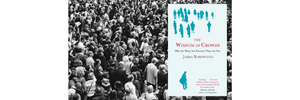The central theme of Surowiecki’s book is that a small group of diversely informed individuals making guesses about the likelihood of uncertain events produce, when their judgements are aggregated, decisions than are invariably better than that of the smartest person in the group.
It’s an entertaining book that has many case studies to illustrate that central theme. And Surowiecki goes to some length to explain how it all works, using both familiar and less well known examples.
What insurers will find of particular interest in the book is what it has to say about how decisions can be influenced, both for the better and worse. Let’s start with diversity. If your group is made up of people with the same type of skills or a similar level of intelligence, then this acts against good decision making. Adding in a few people who know less but who have different skills actually improves the group’s performance.
This is because good decision making thrives on there being a diverse range of perspectives for the group to consider. Groups that are too much alike find it harder to keep learning because each member is bringing less and less new information to the table. Independent thinking matters!
What makes a Group Wise?
So what else does into making a group ‘wise’? Surowiecki sets out these five criteria:
- diversity of opinion – each person should have private knowledge even if it is just an eccentric interpretation of the known facts;
- independence – people’s opinion should not be determined by the opinions of those around them;
- decentralisation – people are able to specialise and draw on local knowledge;
- aggregation – some mechanism exists for turning private judgements into a collective decision;
- trust – each person trusts the collective group to be fair.
Surowiecki finds that one of the things that gets in the way of teams striving to make better decisions is the tendency of leaders to be hostile to opposing views from subordinates. It strikes me therefore that to use the ‘wisdom of crowds’ to improve team decision making, insurers will need to coach their leaders in being more open and supportive of differing views. There’s no point recruiting clever people if their managers can’t bear to hear their alternative views.
I’m not saying that those managers have to agree with those alternative views. They just need to acknowledge them, respect them and admit them into the pool of opinions that the team is weighing up. I remember being recruited for a very good job by someone who wanted to hear alternative views and be challenged (respectfully) on their own views. Unfortunately, the firm’s chief executive was far less amenable in this way, so I had two very different experiences of the two people.
The Customer Voice
You can see how the ‘wisdom of crowds’ links to the idea in UK regulatory circles of firms having a customer voice. So for example, such a voice has a role to play in product design, to raise questions and any concerns about how the product is being put together and delivered to the right audience. All they have to do is advocate on the part of the customer. As mentioned earlier, they don’t need to be experts in this.
Surowiecki mentions research in which the presence of just one voice within a team, raising questions about the task in hard, can be enough to pull the team towards better decisions. That’s the customer voice in action.
The ‘Wisdom of Crowds’ was published in 2004, so I’m sure that there will have been other books since that explore and extrapolate the themes that Surowiecki brings together. That said, it was Surowiecki’s book that made the impact and I would recommend it.


